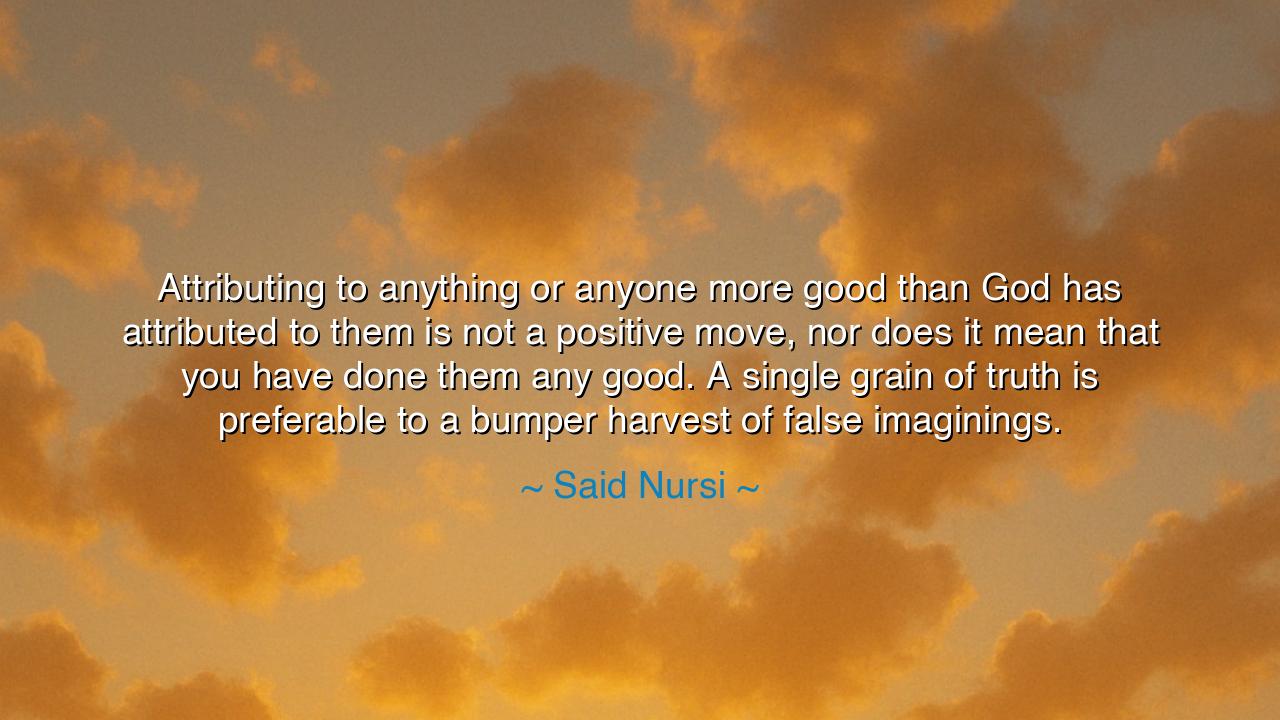
Attributing to anything or anyone more good than God has
Attributing to anything or anyone more good than God has attributed to them is not a positive move, nor does it mean that you have done them any good. A single grain of truth is preferable to a bumper harvest of false imaginings.






When Said Nursi declared, “Attributing to anything or anyone more good than God has attributed to them is not a positive move, nor does it mean that you have done them any good. A single grain of truth is preferable to a bumper harvest of false imaginings,” he unveiled a wisdom that pierces through illusion. His words remind us that true honor lies in honesty, not exaggeration, and that to cloak someone in false praise is to rob them of the dignity of their real worth. To magnify beyond what Heaven has granted is not to elevate, but to distort.
The ancients themselves taught this lesson. In the temples of Greece, poets raised men to the rank of gods, but hubris followed, and ruin fell upon those who accepted crowns not meant for them. For Nursi, the danger is the same: to ascribe more good than belongs to a person or a thing is to weave falsehood, and falsehood, however sweet, bears only corruption in the end. Better, he teaches, to hold a single grain of truth, small yet eternal, than to heap mountains of lies that crumble like sand in the wind.
History too reveals the peril of misplaced praise. Consider the emperors of Rome, who were hailed as divine, worshipped in temples, their faces etched in gold. Yet these honors were empty, for the emperors were men of flesh, prone to cruelty, folly, and death. Their false exaltation could not save them; in time, it invited their downfall. Here we see Nursi’s warning come alive: a bumper harvest of false imaginings brought no blessing, only ruin.
Yet his words also carry a call to humility and integrity. To see someone as they truly are—no more, no less—is to honor them rightly. When we deal in truth, even if it seems small, we build trust, clarity, and justice. False glorification may glitter, but it corrupts both giver and receiver, while even the smallest fragment of reality is a seed that can grow into wisdom.
Therefore, let us pass this teaching onward: cling to the grain of truth, even if the world prefers pleasing illusions. Praise what is truly good, and recognize limits where they are. For in truth, however modest, lies the foundation of strength; but in false imagining, however abundant, lies the certainty of collapse. To walk with truth is to walk with God’s measure, and in that measure, all things find their rightful place.






MLTran Huynh Mai Linh
Said Nursi’s quote challenges the tendency to exaggerate or idolize. While it’s natural to want to see the best in others, attributing more goodness than is true can ultimately harm relationships and our understanding of the world. How do we strike a balance between appreciating others' strengths and acknowledging their flaws without either idealizing or devaluing them? How do we create a more truthful and grounded narrative around the people in our lives?
TBNguyen Thi Binh
I appreciate how Nursi emphasizes the importance of truth over embellishment. It's tempting to indulge in idealized versions of reality, whether about people or situations, but doing so ultimately leads to disappointment. The grain of truth is something to hold on to because it builds a more stable foundation. But how do we prevent ourselves from falling into the trap of false imaginings when society often rewards the exaggerated or the fantastical?
TTNguyen Giap Thanh Tra
This quote highlights the danger of idealization, where we project unrealistic virtues onto others or things, distorting reality. Nursi warns that this leads to disappointment and disillusionment. I wonder, though, if there is ever a time when lifting someone up with exaggerated praise might serve a positive purpose. Is there any room for a little idealism, or should we always ground our perceptions in the simplest truth?
MBMen Bu
Nursi’s quote strikes at the heart of authenticity. It suggests that honesty, even in small doses, is far more valuable than grandiose but empty praise. This makes me think about how we often inflate people's achievements or abilities, especially in social media and public life, only to face disillusionment later. How can we encourage a culture of truth over embellishment, where people’s actual qualities are appreciated for what they truly are?
PTPhuong Thuy
This quote resonates with the idea of humility and truth. It reminds us that over-exaggerating someone's qualities or attributes is not only misleading but can lead to unrealistic expectations. It also challenges the temptation to indulge in false hopes or illusions. How often do we attribute more to others than what is true, and how can we train ourselves to focus on the truth rather than the idealized versions we create?